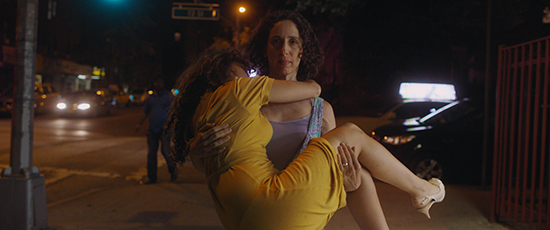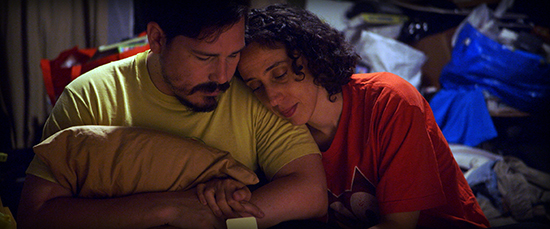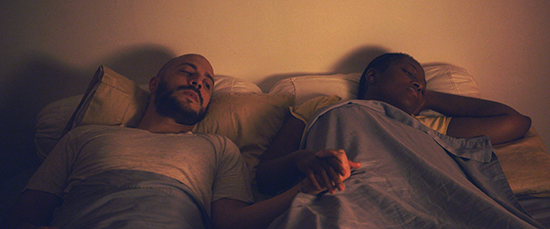It Gets Better, Really
Tomorrow Ever After is Israeli-American filmmaker Ela Thier’s second full-length feature (the first, 2012’s Foreign Letters, was inspired by her own immigration story). This smart, entertaining indie, about a historian from the year 2592 who is accidentally transported back to present-day New York City, mixes comedy and science fiction to tell a story that resonates deeply in these unsettled times. Unlike many time-travel movies, in which the future is a post-apocalyptic dystopia, Tomorrow Ever After features a protagonist, Shaina (played wryly by Thier herself), who comes from a much better era than the period known as The Great Despair (that’s us, folks!). She’s initially shocked by everything here, from litter to our isolation from each other. Through her eyes, we see ourselves and it’s not a pretty picture.
We first see Shaina wandering the streets, wearing a long dress and pants ensemble that’s vaguely high-tech, but not enough to stand out in modern-day New York. She gapes at everything from heavy bike chains to cigarette butts and discarded fast-food cups. Spotting fellow humans at an outdoor café, she runs over and hugs one guy, happily introducing herself and asking what year it is. Of course he’s freaked out and she is repeatedly rebuffed when she hugs other strangers, asking for their help. Shaina tries to contact home on her “Implement,” a cool device that morphs from a small card into a tablet, and reports her shocking findings (“I’m looking at plastic and I’m not in a museum,” “Hugs are perceived as acts of aggression”). Accosted by a nervous mugger (Nabil Vinas), she agrees to accompany him to an ATM (whatever that is) and lets him use her card, which somehow works. “It’s for money!” she realizes with delight, having studied this outmoded concept of currency.
Milton the mugger, thinking that Shaina is a veritable jackpot (as well as a crackpot), reluctantly allows her to tag along home, but things get complicated with his suspicious girlfriend Imani (Ebbe Bassey), so he unloads her on a schizophrenic friend. The latter is the only one who both enjoys her hugs and believes her tale of a physics lab accident and resulting 600-year time trip. The rest of the film details Shaina’s misadventures as she tries to find a team of 21st-century physicists who might be able to repair her broken Implement, allowing her to return home. We also see the effect she has on Milton’s life and on others she comes in contact with.
Though the theme of stranded time-traveler struggling to get home amid a hostile and disbelieving populace is familiar, Tomorrow Ever After offers a charmingly unique take. Its sharp yet whimsical tone is clearly the work of a singular mindset, namely Thier, who both wrote and directed the film, in addition to embodying its heroine. There are a few mildly disturbing scenes (Shaina manhandled in a bar and at Bellevue Hospital), but the film is generally good-natured and open-hearted.
It’s fun watching Shaina discover and observe things she’s only ever read about: a laptop computer, drunkenness, advertising. It’s also illuminating to see her recoil from old-fangled things like packaged food, noting that it makes people sick (the average life span in 2592 is 160). Her observations, while humorous, serve to remind us yet again of how much we suffer both physically and psychically in this data- and market-driven age. The film ends on an upbeat note, as dismay over the plight of 21st-century humanity gives way to the realization that things do get better. Tomorrow Ever After seems like a wish for the future of humankind, one that we can all share no matter how unlikely it may be.
Tomorrow Ever After opens on Friday, May 5, at Cinema Village, 22 East 12th St., Manhattan.
—Marina Zogbi




